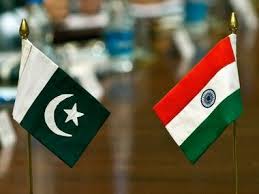The collapse of planned peace talks between India and Pakistan hours before they were to start on Sunday has raised questions about the arch-rivals' willingness to overcome mutual mistrust, built since their separation almost seven decades ago, Reuters reported.
This is the second time the nuclear-armed neighbors have canceled talks since Indian Prime Minister Narendra Modi took office in May last year, with both sides choosing to engage in a war of words ahead of the planned two-day meeting of their top security advisers.
Since Modi and his Pakistani counterpart, Nawaz Sharif, agreed on the talks in Russia last month, ceasefire violations across the countries' border have increased. Analysts fear they may escalate.
"(What it means is more) mutual accusations, acrimony, more provocations," said Siddharth Varadarajan, a political analyst and former editor of the Hindu newspaper in India.
"In other words, contribution of the pattern we have seen in the past few weeks."
India and Pakistan have fought three wars since becoming independent nations in 1947, two of them over the Himalayan region of Kashmir, which both claim in full but rule in part.
New Delhi has for years accused Pakistan of backing separatist Muslim rebels in India's part of Kashmir. Pakistan denies the allegations and blames India for fomenting unrest inside Pakistan.
In the now-canceled talks, India wanted to only discuss terrorism-related issues and objected to Pakistan's intentions of meeting separatists from Kashmir. Pakistan wanted a wider agenda.
Pakistani National Defence University professor Pervaiz Iqbal Cheema told the country's Express Tribune newspaper calling off the talks was not good for regional peace, and that Kashmir will always be on the agenda of any India-Pakistan talks.
Aakar Patel, a long-time Modi observer and the new head of Amnesty International in India, said New Delhi's position had been weakened.
"How will not talking solve this?" he wrote in the Times of India. "If we are serious about getting something out of them, we have to engage with them."
Pakistan's decision to pull out followed Indian Foreign Minister Sushma Swaraj's ultimatum to stick to a terrorism-related agenda.
India called Pakistan's decision "unfortunate". Swaraj said on Saturday Sharif was under domestic pressure to pull out.
In August last year, India called off planned meetings between the countries' foreign secretaries as Pakistan wanted to meet with Kashmiri leaders - as has been the practice that is now opposed by the Indian government led by nationalist Modi.
The prospects of the long-awaited talks had been clouded in recent weeks by a series of militant attacks and border skirmishes. Swaraj said there had been 91 ceasefire violations since the meeting between Modi and Sharif in Ufa in Russia.






